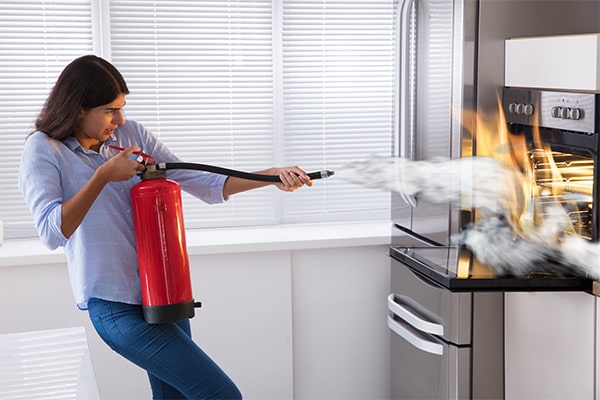
A portable fire extinguisher has the power to save lives and safeguard property, effectively extinguishing a small fire or controlling it until help arrives. Yet, it’s essential to recognize the limitations of these tools. As fire can escalate rapidly, the utmost priority for residents is to ensure their safety and evacuate swiftly.
Fire extinguishers are a vital part of a fire response plan, but the heart of this plan lies in a well-thought-out escape route. Every household can embrace the responsibility of creating a home fire escape plan and maintaining working smoke alarms, empowering them to protect what matters most.
Safety Tips
- Use a portable fire extinguisher when the fire is confined to a small area, such as a wastebasket, and is not spreading. Ensure everyone has exited the building, the fire department has been called, and the room is clear of smoke.
- To operate a fire extinguisher, remember the acronym PASS:
**Pull the pin**. Hold the extinguisher with the nozzle pointed away from you and release the locking mechanism.
**Aim low**. Direct the extinguisher at the base of the fire.
**Squeeze the lever** slowly and evenly.
**Sweep the nozzle** from side to side.
For home use, choose a multi-purpose extinguisher that can tackle various types of fires. Select one that is large enough to handle a small fire but light enough for easy maneuverability.
Ensure the fire extinguisher bears the label of an independent testing laboratory. Familiarize yourself with the instructions and operation of the extinguisher before an emergency arises. Take advantage of hands-on training offered by local fire departments or fire equipment distributors.
Place fire extinguishers near exits, positioning yourself with a clear escape route when using the device. If smoke fills the room, prioritize your safety and leave immediately.
Know when to evacuate. Fire extinguishers are part of a fire response plan, but remember that your safe escape is paramount. Every household should embrace the importance of a fire escape plan and working smoke alarms.

Portable fire extinguishers and children
The NFPA believes children should focus on safety rather than learning to operate portable fire extinguishers. Educating children on extinguishers detracts from the vital message of escaping and staying safe during a fire. Children may not yet possess the maturity or judgment to assess whether a fire can be managed. They might also lack the physical strength and dexterity needed for the complex actions required to extinguish flames. If the fire spreads, they may be unsure how to respond. Therefore, the NFPA emphasizes that only trained adults, who are equipped with the knowledge and skills to handle portable fire extinguishers, should take on this responsibility.


